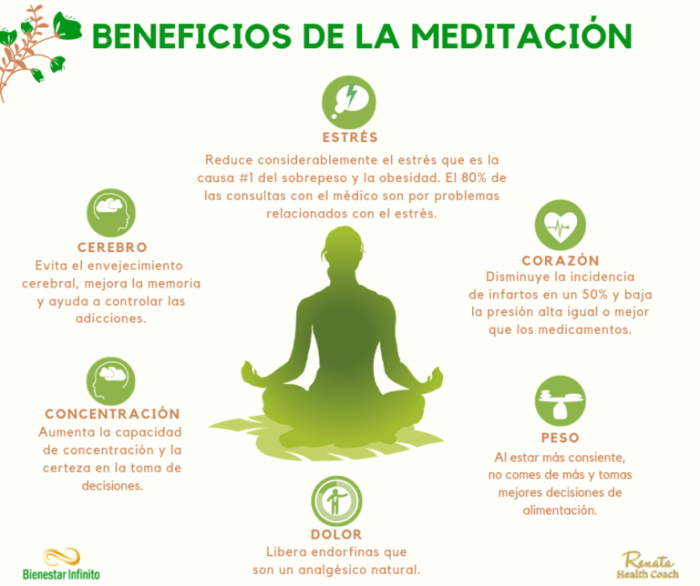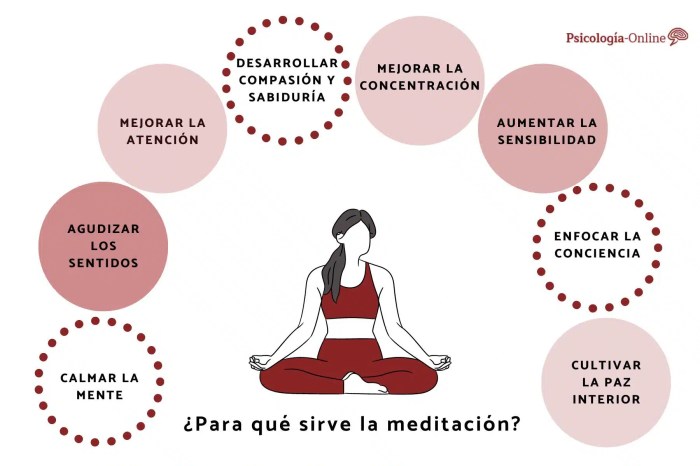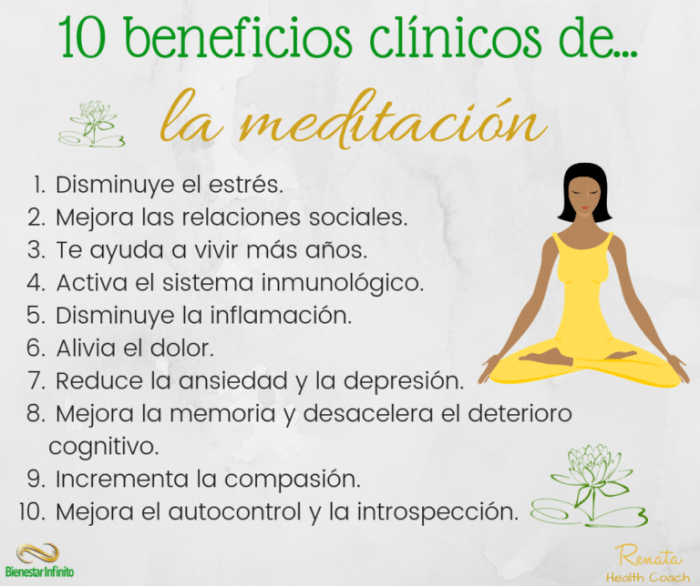12 Benefits of Meditation for Overall Wellness sets the stage for an enlightening journey into the multitude of advantages that meditation offers for your holistic well-being. Let’s delve into the transformative impact of this ancient practice on your physical, mental, and spiritual health.
In this comprehensive guide, we will explore the numerous benefits of meditation, ranging from improved physical health to enhanced cognitive functions, and even its role in fostering spiritual connections.
Introduction to Meditation
Meditation is a practice that involves focusing the mind and eliminating the stream of thoughts to achieve a state of mental clarity and emotional calmness. The purpose of meditation is to cultivate a sense of inner peace, reduce stress, improve concentration, and promote overall well-being.
History and Origins of Meditation Practices
Meditation has been practiced for thousands of years and has its origins in ancient spiritual traditions. It has been an integral part of various cultures, including Hinduism, Buddhism, Taoism, and Christian mysticism. The earliest documented evidence of meditation dates back to around 1500 BCE in ancient India.
- Ancient Indian scriptures such as the Vedas and Upanishads mention meditation as a way to connect with the divine and attain self-realization.
- In Buddhism, meditation is a key component of the Noble Eightfold Path, leading to enlightenment and liberation from suffering.
- Taoist meditation practices focus on cultivating energy, balance, and harmony within the body through techniques like Qigong and Tai Chi.
- Christian mystics like St. John of the Cross and St. Teresa of Avila practiced contemplative meditation to deepen their relationship with God.
Different Types of Meditation Techniques
There are various meditation techniques that cater to different preferences and goals. Each technique has its unique focus and benefits, allowing individuals to find the practice that resonates with them the most.
- Mindfulness Meditation: Involves focusing on the present moment without judgment, observing thoughts and sensations as they arise.
- Transcendental Meditation: Utilizes a mantra or sound to transcend the conscious mind and access deeper states of awareness.
- Loving-Kindness Meditation: Cultivates feelings of love and compassion towards oneself and others through the repetition of positive affirmations.
- Body Scan Meditation: Involves systematically scanning the body for tension and releasing it through deep relaxation techniques.
Physical Benefits of Meditation
Meditation not only benefits the mind but also has a profound impact on our physical health. Let’s explore the various ways in which regular meditation can improve our overall well-being.
Reducing Stress and Anxiety
Meditation has been shown to be effective in reducing stress and anxiety levels. By calming the mind and promoting relaxation, meditation helps lower the production of stress hormones like cortisol. This, in turn, can alleviate symptoms of anxiety and improve overall mental health.
Improving Sleep Quality
One of the physical benefits of meditation is its positive impact on sleep quality. By practicing meditation regularly, individuals often experience improved sleep patterns and a deeper, more restful sleep. This is attributed to the relaxation and calming effects of meditation, which can help quiet the mind and promote better sleep hygiene.
Increasing Energy Levels
Regular meditation practice has been linked to increased energy levels throughout the day. By reducing stress, anxiety, and promoting better sleep, meditation can help individuals feel more refreshed and energized. This boost in energy can lead to greater productivity and overall well-being in daily activities.
Mental Benefits of Meditation: 12 Benefits Of Meditation For Overall Wellness
Meditation not only has physical benefits but also plays a crucial role in improving our mental health and overall well-being. Let’s explore how meditation can positively impact our mental state, enhance focus and concentration, and contribute to emotional well-being.
Improved Focus and Concentration
- Meditation helps to train the mind to focus on the present moment, allowing individuals to concentrate better on tasks at hand.
- By practicing mindfulness during meditation, individuals can enhance their ability to stay focused and attentive, reducing distractions and improving productivity.
- Regular meditation has been shown to increase attention span and cognitive function, leading to better decision-making and problem-solving skills.
Enhanced Emotional Well-being
- Through meditation, individuals can develop a greater sense of self-awareness and emotional regulation, leading to reduced stress, anxiety, and negative emotions.
- By cultivating mindfulness and compassion during meditation, people can improve their relationships with themselves and others, fostering a sense of empathy and understanding.
- Meditation can help individuals let go of past grievances, forgive themselves and others, and cultivate a positive outlook on life, promoting emotional resilience and well-being.
Spiritual Benefits of Meditation

Meditation goes beyond just physical and mental well-being; it also offers profound spiritual benefits that can enhance your overall sense of connection and inner peace.
Deepening Spiritual Connections
Meditation provides a space for introspection and self-reflection, allowing individuals to connect with their inner selves on a deeper level. This process can lead to a greater understanding of one’s purpose, values, and beliefs, ultimately strengthening spiritual connections.
- Meditation helps individuals tap into their intuition and inner wisdom, fostering a sense of spiritual guidance.
- By quieting the mind and focusing inward, meditation can open the door to spiritual experiences and insights that may not be accessible in everyday life.
- Through regular practice, meditation can cultivate a sense of interconnectedness with the universe, promoting feelings of unity and oneness.
Fostering Inner Peace and Harmony
One of the key spiritual benefits of meditation is its ability to create a sense of inner peace and harmony, transcending the chaos of daily life.
- Meditation encourages individuals to let go of attachments and ego-driven desires, leading to a state of acceptance and contentment.
- By cultivating a sense of presence and mindfulness, meditation helps individuals stay rooted in the present moment, reducing anxiety and promoting peace of mind.
- Through practices like loving-kindness meditation, individuals can cultivate feelings of compassion and empathy towards themselves and others, fostering harmonious relationships and spiritual growth.
Relationship Between Meditation and Mindfulness
Mindfulness is a key aspect of meditation practice, as it involves being fully present and aware in the moment, without judgment or attachment.
- By incorporating mindfulness into meditation, individuals can deepen their spiritual practice by staying attuned to their thoughts, emotions, and sensations without reacting impulsively.
- Practicing mindfulness in meditation can help individuals cultivate a sense of gratitude, acceptance, and non-attachment, which are essential components of spiritual growth and self-realization.
- Through the integration of meditation and mindfulness, individuals can develop a stronger connection to their spiritual beliefs, values, and sense of purpose, leading to a more fulfilling and enriched spiritual life.
Social Benefits of Meditation
Meditation has the power to not only transform our inner selves but also improve our relationships and social interactions with others. By cultivating mindfulness and self-awareness through meditation, we can enhance our ability to connect with those around us on a deeper level.
Empathy and Compassion
Through regular meditation practice, individuals often experience an increase in empathy and compassion towards others. By developing a greater sense of understanding and empathy, we can better relate to the emotions and experiences of those we interact with, leading to more meaningful and fulfilling relationships.
- Meditation helps us cultivate a sense of empathy by allowing us to tune into our own emotions and thoughts, which in turn enables us to better understand the feelings of others.
- By fostering compassion through meditation, we can approach interactions with kindness and understanding, creating a positive impact on our relationships.
Sense of Community and Belonging
Practicing meditation can also promote a sense of community and belonging among individuals who share a common interest in mindfulness and self-discovery. This sense of connection can lead to the formation of supportive networks and relationships that contribute to overall well-being.
- Through group meditation sessions or mindfulness retreats, individuals can come together to cultivate a sense of community and support each other on their journey towards self-improvement.
- By engaging in mindful activities with like-minded individuals, people can feel a sense of belonging and unity, fostering a supportive and inclusive environment.
Cognitive Benefits of Meditation
Meditation not only has physical and mental benefits but also plays a significant role in enhancing cognitive functions. Let’s explore how incorporating meditation into your daily routine can have a positive impact on your cognitive abilities.
Enhanced Memory and Focus
- Meditation has been shown to improve memory retention and recall by reducing stress levels that can impair cognitive functions.
- Regular practice of meditation can also enhance focus and concentration, making it easier to stay present and attentive in various tasks.
Boost in Creativity and Problem-Solving Skills
- Through meditation, individuals can tap into their creative potential by fostering a calm and clear mind that allows for innovative thinking.
- By reducing mental clutter and promoting mindfulness, meditation can help in approaching problems from a fresh perspective and finding effective solutions.
Workplace Benefits of Meditation
Meditation is not only beneficial for personal wellness but also has a significant impact on workplace performance and productivity. Incorporating meditation into your daily routine can lead to numerous benefits in the workplace.
Increased Productivity and Efficiency
- Meditation helps improve focus and concentration, allowing employees to complete tasks more efficiently.
- By reducing distractions and enhancing cognitive abilities, meditation enables individuals to work with clarity and precision.
- Regular meditation practice has been linked to enhanced decision-making skills and problem-solving abilities.
Reduced Workplace Stress and Burnout
- Meditation promotes relaxation and helps manage stress levels, leading to a more peaceful and balanced work environment.
- By cultivating mindfulness, meditation equips individuals with the tools to handle work-related challenges with resilience and composure.
- Reducing stress through meditation can prevent burnout and improve overall job satisfaction and employee retention.
Strategies for Busy Work Schedules
- Find small pockets of time during the workday to practice short meditation sessions, even if it’s just for a few minutes.
- Utilize meditation apps or online resources to access guided meditation sessions that can easily fit into your schedule.
- Consider incorporating mindfulness practices into meetings or breaks to create a more mindful work environment for yourself and your colleagues.
Physical Practices Associated with Meditation

Meditation is not just about sitting still and quieting the mind. Physical practices can also play a crucial role in enhancing the overall benefits of meditation. By incorporating movement into your meditation routine, you can further improve your physical health and well-being.
Yoga and Tai Chi
- Yoga: Yoga is a mind-body practice that combines physical postures, breathing exercises, and meditation. The gentle stretching and strengthening movements in yoga help improve flexibility, balance, and overall physical strength. By practicing yoga alongside meditation, you can enhance your mind-body connection and promote relaxation.
- Tai Chi: Tai Chi is a Chinese martial art that involves slow, flowing movements and deep breathing. This gentle form of exercise can improve balance, flexibility, and coordination. Incorporating Tai Chi into your meditation practice can help reduce stress, increase mindfulness, and promote overall well-being.
Mindful Movement, 12 Benefits of Meditation for Overall Wellness
- Mindful walking: Walking meditation involves paying attention to each step and the sensations in your body as you walk. This practice can help improve concentration, reduce stress, and increase awareness of the present moment.
- Dance therapy: Dancing mindfully can be a form of moving meditation. By expressing yourself through dance and focusing on the movements of your body, you can release tension, boost mood, and enhance self-awareness.
Scientific Evidence Supporting Meditation

Meditation has been the subject of numerous scientific studies that have consistently shown its positive impact on overall wellness. These studies provide valuable insights into the benefits of meditation and its effects on different aspects of health.
Impact of Meditation on Brain Health
Meditation has been found to have a significant impact on brain health. Research has shown that regular meditation practice can lead to structural changes in the brain, including increased grey matter density in areas associated with memory, learning, and emotional regulation. Additionally, meditation has been linked to improved cognitive function, reduced stress levels, and enhanced focus and concentration.
- Studies have demonstrated that meditation can help reduce the production of stress hormones like cortisol, leading to a decrease in anxiety and depression.
- Research has also shown that meditation can increase the levels of feel-good neurotransmitters like serotonin and dopamine, promoting a sense of well-being and happiness.
- Functional MRI scans have revealed that meditation can strengthen neural connections in the brain, improving overall cognitive function and emotional resilience.
Connection Between Meditation and Overall Wellness
Scientific evidence supports the idea that meditation plays a crucial role in promoting overall wellness. Studies have shown that regular meditation practice can have a positive impact on physical health, mental well-being, emotional balance, and spiritual growth.
- Research has indicated that meditation can lower blood pressure, improve cardiovascular health, and boost the immune system, leading to a reduced risk of chronic diseases.
- Studies have also highlighted the role of meditation in enhancing self-awareness, emotional regulation, and interpersonal relationships, contributing to improved social connections and overall well-being.
- Scientific evidence suggests that meditation can help reduce symptoms of anxiety, depression, and other mental health disorders, leading to better mental health outcomes and an increased sense of peace and tranquility.
Meditation Techniques for Beginners
Starting a meditation practice as a beginner may seem daunting, but it is essential to approach it with an open mind and patience. Here are some step-by-step guidance and tips to help you kickstart your meditation journey.
Creating a Conducive Environment
Creating a peaceful and tranquil environment is crucial for a successful meditation practice. Here are some tips to set the right atmosphere:
- A quiet and clutter-free space where you can sit comfortably.
- Dim lighting or natural light to create a calming ambiance.
- Use of essential oils, candles, or incense to enhance relaxation.
Common Challenges Faced by Beginners
Embarking on a meditation practice can present challenges for beginners. Here are some common hurdles and how to overcome them:
- Restlessness: Start with short meditation sessions and gradually increase the duration as you build endurance.
- Racing Thoughts: Focus on your breath or a mantra to anchor your mind and bring back focus whenever thoughts wander.
- Consistency: Set a regular schedule and commit to practicing meditation daily, even if it’s just for a few minutes.
Mindfulness Practices in Daily Life

Mindfulness is a powerful practice that can be seamlessly integrated into our daily routines, allowing us to cultivate a sense of presence and awareness in all that we do. By incorporating mindfulness into our everyday lives, we can experience a multitude of benefits that enhance our overall well-being.
Examples of Mindfulness Exercises
- Body Scan Meditation: Take a few moments to focus on each part of your body, from head to toe, noticing any sensations without judgment.
- Deep Breathing: Engage in deep, intentional breathing exercises to center yourself and bring your focus to the present moment.
- Mindful Walking: Pay attention to each step you take, feeling the ground beneath your feet and the movement of your body as you walk.
- Sensory Awareness: Use your senses to fully experience the sights, sounds, smells, tastes, and textures of your surroundings.
Long-Term Benefits of Mindfulness
- Stress Reduction: Mindfulness practices can help lower stress levels and promote a sense of calm and relaxation.
- Improved Focus: By training your mind to be present, you can enhance your concentration and attention span in daily tasks.
- Emotional Regulation: Mindfulness allows you to observe your emotions without reacting impulsively, leading to better emotional regulation.
- Enhanced Relationships: Being present and attentive in interactions can improve communication and deepen connections with others.
Holistic Approach to Wellness through Meditation
Meditation is not just a standalone practice; it can serve as a cornerstone of a holistic wellness routine that encompasses all aspects of your well-being. By incorporating meditation into your daily life, you can experience a profound transformation that goes beyond just physical health.
Combining Meditation with Other Wellness Practices
When combined with other wellness practices such as exercise, healthy eating, and adequate sleep, meditation can amplify the benefits you receive. This synergistic approach can lead to optimal health by nurturing your body, mind, and spirit simultaneously.
- Meditation and Exercise: By pairing meditation with physical activity, you can enhance your overall fitness levels and mental clarity.
- Meditation and Nutrition: Practicing mindfulness during meals can improve digestion and help you make healthier food choices.
- Meditation and Sleep: A regular meditation practice can promote better sleep quality, leading to improved energy levels and cognitive function.
Interconnectedness of Physical, Mental, and Spiritual Well-Being
Meditation is a powerful tool that can address the interconnected nature of physical, mental, and spiritual well-being. By calming the mind, reducing stress, and fostering a sense of inner peace, meditation can create a harmonious balance within your entire being.
Meditation acts as a bridge that connects your body, mind, and spirit, promoting holistic wellness and alignment.
Closure

In conclusion, the 12 Benefits of Meditation for Overall Wellness encapsulate the profound ways in which this practice can elevate every aspect of your life. Embrace meditation as a powerful tool for achieving balance and harmony in your journey towards optimal wellness.